 Petzlover
Petzlover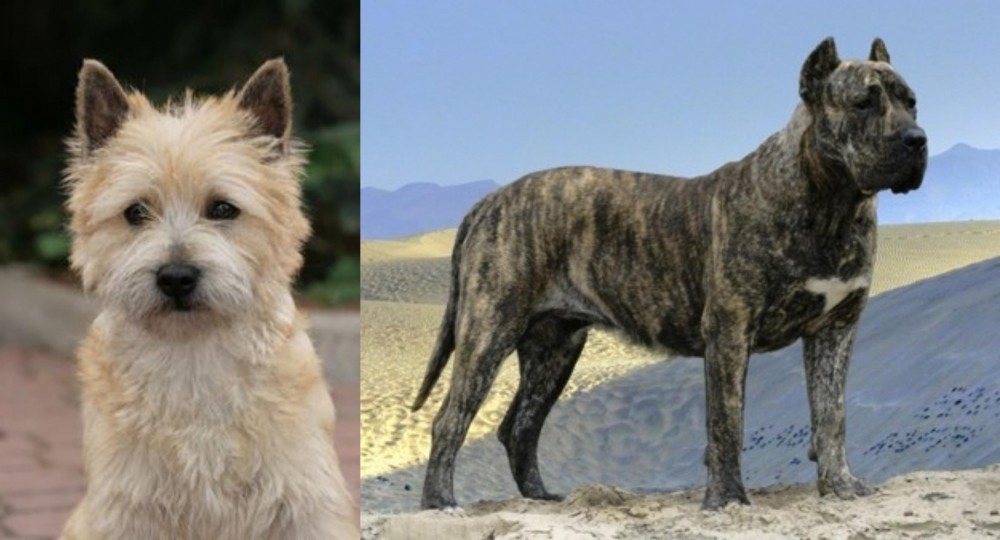 Cairn Terrier is originated from United Kingdom but Presa Canario is originated from Spain. Cairn Terrier may grow 32 cm / 12 inches shorter than Presa Canario. Cairn Terrier may weigh 52 kg / 114 pounds lesser than Presa Canario. Cairn Terrier may live 4 years more than Presa Canario. Both Cairn Terrier and Presa Canario has almost same litter size. Both Cairn Terrier and Presa Canario requires Low Maintenance.
Cairn Terrier is originated from United Kingdom but Presa Canario is originated from Spain. Cairn Terrier may grow 32 cm / 12 inches shorter than Presa Canario. Cairn Terrier may weigh 52 kg / 114 pounds lesser than Presa Canario. Cairn Terrier may live 4 years more than Presa Canario. Both Cairn Terrier and Presa Canario has almost same litter size. Both Cairn Terrier and Presa Canario requires Low Maintenance.
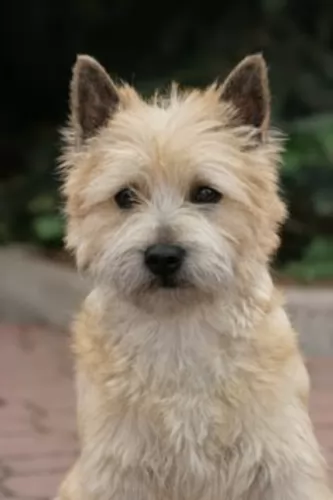 The Cairn Terrier originates in the Scottish Highlands. This feisty little dog was given the name Cairn, as he used to hunt prey between the Scottish cairns. At first the dog was grouped as a ‘Skye Terrier’way back in the 1900s with the Scottish and West Highland White Terrier. Then the different breeds began to be bred separately.
The Cairn Terrier originates in the Scottish Highlands. This feisty little dog was given the name Cairn, as he used to hunt prey between the Scottish cairns. At first the dog was grouped as a ‘Skye Terrier’way back in the 1900s with the Scottish and West Highland White Terrier. Then the different breeds began to be bred separately.
The name Cairn Terrier didn’t appear in print till 1887. It was in 1912 that the Kennel Club of the United Kingdom recognized the Cairn Terrier.
 Known also as the Canary Mastiff, the Presa Canario hails from the Canary Islands. He was originally bred for guarding livestock.
Known also as the Canary Mastiff, the Presa Canario hails from the Canary Islands. He was originally bred for guarding livestock.
This isn’t a new breed by any means, and it is believed that the dog dates back to the 15th and 16th centuries. The roots of the dog can be traced back to the Iberian Presa, a medium sized mastiff breed. A number of other Hispanic breeds have contributed to the formation of the Presa Canario, such as the Presa Espanol.
Its numbers have dropped over the years, but in the 1970s, reputable breeders bred Presa Canarios, a courageous, territorial dog.
Because of its aggressive tendencies, the dog has been banned from quite a few countries. It is found in the USA but not recognized by the American Kennel Club.
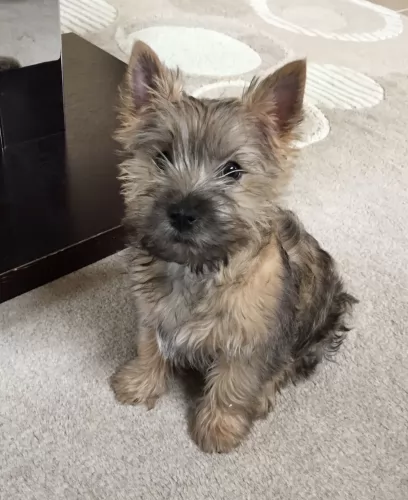 The small sturdily built working Terrier is intelligent and courageous. Bright-eyed, he is small and active and he just loves to work- and party hard with his human family. You’ll see if you’ve got a ball you want to throw for him, his tail is quivering in anticipation and his ears are erect and alert to any noise. He is smart, independent and courageous.
The small sturdily built working Terrier is intelligent and courageous. Bright-eyed, he is small and active and he just loves to work- and party hard with his human family. You’ll see if you’ve got a ball you want to throw for him, his tail is quivering in anticipation and his ears are erect and alert to any noise. He is smart, independent and courageous.
The Cairn Terrier has a tough, weather-resistant coat that can be any color but not white. He has a waterproof double coat – the outer one being wiry while the undercoat is soft. You’ll find the coat in man colours such as grey, black, red and brindle with dark points on the ears and muzzle.
The interesting thing with a Cairn is that when you get a puppy, you can’t be sure what color he will end up being as it changes over the years. The ears are fox-like, small and erect, and the natural medium-to-short tail is held straight out.
 The Presa Canario is a large Molosser-type dog breed originally bred for working livestock.He stands at between 56 to 65cm in height and weighs between 38 and 60kg. He has a thick, muscular body with a black mask over the broad head.
The Presa Canario is a large Molosser-type dog breed originally bred for working livestock.He stands at between 56 to 65cm in height and weighs between 38 and 60kg. He has a thick, muscular body with a black mask over the broad head.
The ears were always cropped which just added to his aggressive appearance. When left they are high set and floppy, being of medium length. The coat is short and coarse and he is a low shedder. The coat comes in colors such as fawn, tan, or brindle.
Strong willed, confident and determined, the Presa Canario may well have an intimidating look.He looks both powerful and even a bit aggressive, but with training and socialization, the highly intelligent Presa Canario is actually a calm, docile dog, totally loyal and loving with his human family.
These dogs are suspicious of strangers and this makes them excellent watchdogs. For new dog owners, the Presa Canario isn’t a good first choice as he is strong-willed and can be aggressive when in the wrong hands. There are however, always exceptions, but he isn't considered to be a good choice of dog when there are children in the home.
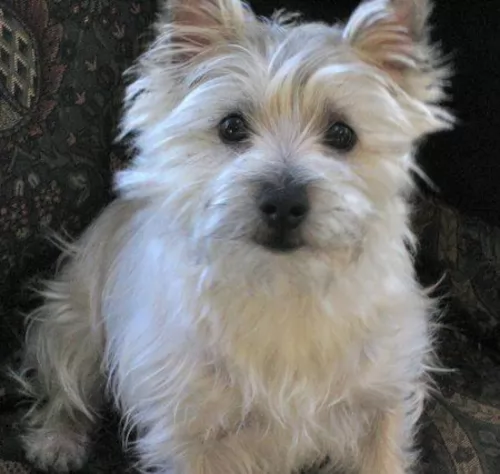 The Cairn Terrier is a fearless, jaunty little dog, known for his courageous spirit and inquisitive nature. He may be small, but he is stubborn. He will respond well to training and socialization which will turn him into the most awesome pet for families. He can make a wonderful friend and playmate for children too. Socialization and training ensures he gets on well with other pets in the household too.
The Cairn Terrier is a fearless, jaunty little dog, known for his courageous spirit and inquisitive nature. He may be small, but he is stubborn. He will respond well to training and socialization which will turn him into the most awesome pet for families. He can make a wonderful friend and playmate for children too. Socialization and training ensures he gets on well with other pets in the household too.
He is small and energetic, and therefore not the kind of dog you can ignore in terms of exercise. He’ll need a good walk every day and he just loves to chase a ball as it takes him back to the days when he was used to chasing- and catching mice.
He isn’t your typical lap-dog at all and with the right care he becomes a devoted, loyal and loving companion.
 The Presa Canario is a formidable looking dog and has received quite a lot of negative media attention for being aggressive and dangerous. And yet non-aggressive owners who have brought the dog up properly tell of how well mannered and calm their dogs are.
The Presa Canario is a formidable looking dog and has received quite a lot of negative media attention for being aggressive and dangerous. And yet non-aggressive owners who have brought the dog up properly tell of how well mannered and calm their dogs are.
The dog is confident and powerful and can be loyal and loving while also being well adjusted. Just like children are the fruit of their parents upbringing, so dogs turn out much the same as the kind of owners that reared them, and in the right hands, this big dog can be loyal quiet, loving and trustworthy.
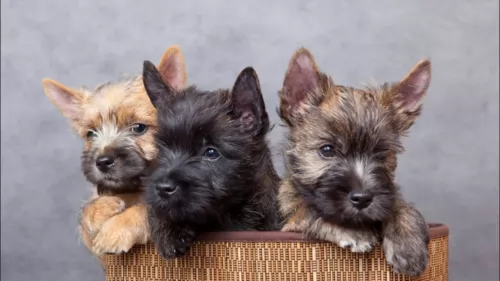 The Cairn Terrier is a robust little dog, and with good care can reach 14 years of age and even older. However, with every dog breed there are some health concerns particular to that breed. With your Cairn Terrier look out for a disease known as Globoid cell leukodystrophy (GCL).
The Cairn Terrier is a robust little dog, and with good care can reach 14 years of age and even older. However, with every dog breed there are some health concerns particular to that breed. With your Cairn Terrier look out for a disease known as Globoid cell leukodystrophy (GCL).
Known also as Krabbe Disease, Globoid cell leukodystrophy (GLD) is a rare but fatal disease. It is caused by a mutation on the dog’s DNA. There is abnormal processing of an enzyme needed for the production of myelin, a substance that protects the nerves in the brain and spinal cord. The dog is weak, it has tremors and isn’t co-ordinated. The Cairn Terrier is a breed of dog more susceptible to GCL.
Your Cairn Terrier may well suffer with joint diseases. These diseases, such as luxating patella which is about loose knee joints, and hip dysplasia which is a degenerative hip disease, can cause plenty of pain and discomfort for your pet.
Glaucoma is an eye disease where there is pressure on the eye, causing inadequate fluid drainage. Without treatment, there can be damage to the optic nerve which can lead to blindness.
 These are large dogs so they are susceptible to hip- or joint dysplasia and canine leishmaniasis.
These are large dogs so they are susceptible to hip- or joint dysplasia and canine leishmaniasis.
This is a skeletal condition, found more often in large dogs. The ball and socket don’t fit properly, grinding as opposed to sliding smoothly. This eventually leads to loss of function of the joint.
There are a few factors that lead to the development of hip dysplasia in dogs, but it is also hereditary. That is why it is so important to provide your dog with the correct nutrition – one that is specially formulated for large breeds.
This is a deadly disease caused by a protozoan parasite found in dogs, mostly in rural areas, and in quite a few areas of the world.
The parasite is transmitted by a sand fly. The clinical signs of dogs with this disease include weakness, fever, swollen lymph nodes, anorexia, weight loss and diarrhea with blood in the stools.
Treatment will require the administration of a special drug. Prognosis for a pet diagnosed with Leishmaniasis is unfortunately not very hopeful.
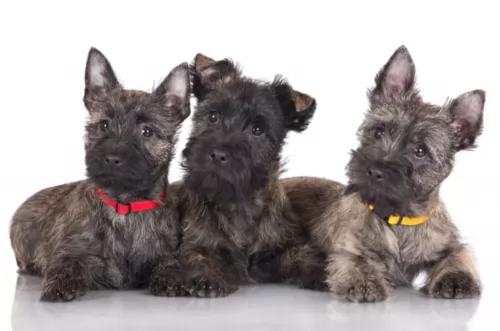 The Cairn Terrier sheds very little and the coat is easy to groom. Give him a thorough brushing twice a week to rid him of loose hairs. Some trimming will be needed as the coat can become shaggy and unruly.
The Cairn Terrier sheds very little and the coat is easy to groom. Give him a thorough brushing twice a week to rid him of loose hairs. Some trimming will be needed as the coat can become shaggy and unruly.
Brush his teeth at least 2 or 3 times a week to prevent tartar build up that can lead to bacteria, gum disease and possible tooth loss.
The Cairn Terrier is small but he is an active dog and therefore needs to be on a high-quality dog food. If you feed him a commercially manufactured food, make sure its appropriate to his age, size and activity levels.
He is a small dog so you want to be careful about not letting him become overweight. Try and alternate his commercially manufactured food with some home-made rice, vegetables and meat and also include some raw meat in from time to time. This is of particular importance as chronic skin allergies are common in all terrier breeds. Make sure that there is always a clean bowl of fresh water available to him day and night.
 The Presa Canario will require being brushed twice a week to rid him of loose hair although he isn’t a heavy shedder.
The Presa Canario will require being brushed twice a week to rid him of loose hair although he isn’t a heavy shedder.
Keep his nails trimmed.
Check inside his ears for signs of redness and the possibility of an ear infection.
When you brush him, check him over for any unusual lumps.
Make sure the dog is neutered or spayed if you don’t want puppies.
Get your vet to the vet if he shows signs of illness.
Make sure his vaccines are up to date to prevent some deadly canine diseases.
Ensure he has a nice comfortable, dry, warm place to sleep.
Ensure he has a top quality diet to enhance longevity and health. Commercially manufactured dog foods are a convenient means to feed your pet, and there are some excellent brands. Avoid the ones with low quality ingredients that don’t have the right balances of vitamins and minerals.
High quality dry kibble can become exciting when you add in some home-made food. Dogs thrive on simplicity, so boiled chicken, sweet potatoes, brown rice or pasta, carrots and spinach will be 100% sufficient for him. Chop this food up and add it into the dry kibble twice a week as a tasty treat.
Also, your pet will thrive on a bit of raw meat added in from time to time. Make sure he is never without a constant supply of fresh, cool water.
Make sure that your large pet gets a good quota of daily exercise outdoors. Lots of hectic ball- and rope games will keep him happy and keep him slim. Take him for a walk every day.